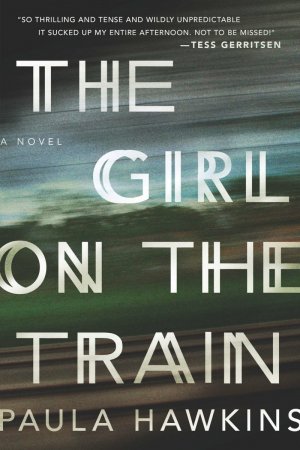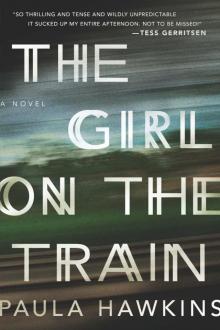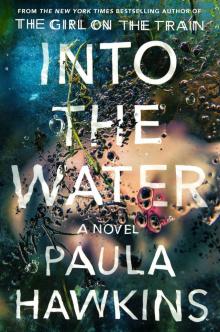- Home
- Paula Hawkins
Into the Water Page 11
Into the Water Read online
Page 11
Three days before her birthday, there was a storm. It built all day, a vicious wind ripping down the valley, white horses riding the breadth of the pool. At night the storm broke, the river pushing at its banks, trees felled along its length. The rain came down in sheets, the whole world underwater.
Lauren’s husband and son slept like babies, but Lauren was awake. In the study downstairs, she sat at her husband’s desk, a bottle of his favoured Scotch at her elbow. She drank a glass and tore a sheet of paper from a notebook. She drank another glass, and another, and the page remained blank. She couldn’t even decide on a form of address—“dear” seemed dismissive and “dearest” a lie. With the bottle almost empty and the page still unmarked, she walked out into the storm.
Her blood thick with drink and grief and anger, she made her way to the pool. The village was empty, hatches battened down. Unseen and undisturbed, she clambered and slipped through mud to the cliff. She waited. She waited for someone to come, she prayed that the man she had fallen in love with might miraculously somehow know, might somehow sense her despair and come to save her from herself. But the voice she heard, calling her name in panicked desperation, was not the one she wanted to hear.
And so boldly she stepped up to the precipice and, eyes wide open, pitched herself forward.
There was no way she could have seen him, no way she could have known that her boy was down there, behind the tree line.
No way she could have known that he had been woken by his father’s shouts and the sound of the front door slamming, that he had got up and run downstairs and out into the storm, his feet bare and his skinny limbs covered only by the thinnest cotton.
Sean saw his father climbing into the car and screamed for his mother. Patrick turned, yelling at his son to go back into the house. He ran towards him, grabbing him roughly by the arm and yanking him off his feet, and tried to force him back into the house. But the boy begged, “Please, please, don’t leave me here.”
Patrick relented. He gathered the boy up and carried him to the car, securing him in the backseat, where Sean cowered, terrified and uncomprehending. He squeezed his eyes tightly shut. They drove to the river. His father parked the car up on the bridge and said to him, “Wait. Wait here.” But it was dark and the rain on the roof of the car sounded like bullets and Sean couldn’t escape the feeling that there was someone else in the car with him, he could hear their ragged breathing. So he got out and ran, tripping down the stone steps and falling in the mud on the path, blundering in the darkness and the rain towards the pool.
There was a story, later, at school, that he saw it—he was the boy who watched his mother jump to her death. It wasn’t true. He didn’t see anything. When he got to the pool, his father was already in the water, swimming out. He didn’t know what to do, so he went back and sat under the trees, his back to a stout trunk so that no one could sneak up on him.
It seemed as though he was there for a very long time. Thinking back, he wondered if he might even have fallen asleep, although with the darkness and the noise and the fear, that didn’t seem terribly likely. What he could remember was a woman coming—Jeannie, from the police station. She had a blanket and a torch and she took him back up to the bridge and gave him sweet tea to drink, and they waited there for his father.
Later Jeannie drove him to her house and made him cheese on toast.
But there was no way Lauren could have known any of that.
ERIN
Leaving the funeral, I noticed how many people who had attended the service made their way over to say a few words to Sean Townsend’s father, a man I had been introduced to, incredibly briefly, as Patrick Townsend. There was much shaking of hands and doffing of caps, and all the while he stood there like a major general on parade, back straight and lip stiff.
“Miserable bugger, isn’t he?” I said to the uniform standing next to me. The PC turned and looked at me like I had just crawled out from under a rock.
“Show some respect,” he hissed, and turned his back on me.
“Excuse me?” I said, talking to the scruff of his neck.
“He’s a highly decorated officer,” the PC said. “And a widower. His wife died here, in this river.” He turned again to face me, and without a hint of deference to my position, he sniffed, “So you ought to show some respect.”
I felt like a fucking idiot. But really, how was I supposed to know that the Sean in Nel Abbott’s story was the Sean in the police station? I didn’t know his parents’ names. Fuck’s sake. Nobody told me, and when I read through Nel Abbott’s work it wasn’t like I was paying that much attention to the details of a suicide that took place more than three decades ago. It didn’t seem overly pressing, under the circumstances.
Seriously, how is anyone supposed to keep track of all the bodies around here? It’s like Midsomer Murders, only with accidents and suicides and grotesque historical misogynistic drownings instead of people falling into the slurry or bashing each other over the head.
I drove back to the city after work—some of the others were going to the pub, but thanks to the Patrick Townsend faux pas I was wearing my outsider status a little more heavily than before. In any event, this case is over, isn’t it? No point hanging around.
I felt relieved, the way you do when you finally figure out what movie you’ve seen an actor in before, when something hazy that’s been bothering you suddenly snaps into focus. The DI’s strangeness—the watery eyes, the shaky hands, his disconnectedness—it all makes sense now. It makes sense if you know his history. His family has suffered almost exactly what Jules and Lena are suffering now—the same horror, the same shock. The same wondering why.
I reread Nel Abbott’s section on Lauren Townsend. It doesn’t tell much of a story. She was an unhappy wife, in love with another man. It talks of her distraction, her absence—maybe she was depressed? In the end, who knows? It’s not like this stuff is gospel, it’s just Nel Abbott’s version of history. It must take a strange sense of entitlement, I would have thought, to take someone else’s tragedy like that and write it as though it belonged to you.
Rereading it, I don’t understand how Sean could have stayed here. Even if he didn’t see her fall, he was there. What the fuck does that do to you? Still. He would have been small, I suppose. Six or seven? Kids can block it out, trauma like that. But the father? He walks by the river every day, I’ve seen him. Imagine that. Imagine walking past the place where you lost someone, every single day. I can’t credit it, couldn’t do it. But then I suppose I’ve never really lost anyone. How would I know what that kind of grief feels like?
PART TWO
Tuesday, 18 August
LOUISE
Louise’s grief was like the river: constant and ever-changing. It rippled, flooded, ebbed and flowed, some days cold and dark and deep, some days swift and blinding. Her guilt was liquid, too; it seeped through cracks when she tried to dam it out. She had good days and bad.
Yesterday she had gone to the church to watch them put Nel in the ground. In reality—and she ought to have known this—they didn’t. Still, she got to watch her slide away to burn, so that was what passed for a good day. Even the outpouring of emotion—she had sobbed throughout the ceremony, despite herself—was cathartic.
But today was going to be a bitch. She felt it when she woke, not a presence but an absence. The elation she’d felt at first, her vengeful satisfaction, was already waning. And now, with Nel burned to ashes, Louise was left with nothing. Nothing. At no one’s door could she lay her pain and suffering, because Nel was gone. And she worried that in the end the only place she had to bring her torment was home.
Home to her husband and son. So. Today was going to be a bitch, but that bitch had to be faced, stared down. She had made up her mind; it was time to move on. They needed to go before it was too late.
Louise and her husband, Alec, had been arguing about this—the sort of low-level, q
uiet arguments they had these days—for weeks. Alec felt it would be better to move before the new school term started. They should let Josh start the new school year in a completely new place, he argued, where no one knew who he was. Where he wouldn’t be confronted with his sister’s absence every day.
“So he’ll never have to talk about her?” Louise asked.
“He’ll talk about her with us,” Alec replied.
They’d been standing in the kitchen, their voices strained and hushed. “We need to sell this house and start over,” Alec said. “I know,” he said, raising his hands as Louise began to protest. “I know this is her home.” He faltered then, placing his big hands, mottled with sun damage, on the counter. He hung on as if for dear life. “We have to make some kind of new start, Lou, for Josh. If it were just you and me . . .”
If it were just them, she thought, they’d follow Katie into the water and be done with it. Wouldn’t they? She wasn’t sure Alec would. She used to think that only parents can understand the sort of love that swallows you up, but now she wondered whether it was only mothers who did. Alec felt the grief, of course, but she wasn’t sure he felt the despair. Or the hatred.
So the fault lines were already beginning to show in a marriage she’d thought unshakable. But of course she’d known nothing before. Now it was obvious: no marriage could survive this loss. It would always sit between them—that neither of them had been able to stop her. Worse, that neither of them had suspected a thing. That the two of them had gone to bed and fallen asleep and discovered her empty bed in the morning and had not for a single second imagined she’d be in the river.
There was no hope for Louise, and little, she thought, for Alec, but Josh was different. Josh would miss his sister every day for the rest of his life, but he could be happy: he would. He would carry her with him, but he would also work, travel, fall in love, live. And the best chance he had was to be away from here, away from Beckford, away from the river. Louise knew that her husband was right about that.
Somewhere inside, she’d known this already, she’d just been reluctant to face it. But yesterday, watching her son after the funeral, she had been gripped by terror. His pinched, anxious face. How easily he startled, flinching at loud noises, cowering like a frightened dog in a crowd. The way he constantly turned his gaze to her, as though he was retreating back into early childhood, no longer an independent twelve-year-old, but a frightened, needy little boy. They had to get him away from here.
And yet. This was where Katie had taken her first steps, spoken her first words, played hide-and-seek, cartwheeled around the garden, fought with her little brother, soothed him afterwards, laughed and sung and cried and cursed and bled and hugged her mum every day when she got home from school.
But Louise had made up her mind. Like her daughter, she was determined, although the effort was immense. Just to get up from the kitchen table, walk to the bottom of the stairs and then climb them, to place her hand on the door handle, to push down, to enter her room for the last time. Because that’s what it felt like. This was the last time it would be her room. After today, it would be something else.
Louise’s heart was a block of wood; it didn’t beat, it only pained her, scraping against soft tissue, tearing through vein and muscle, flooding her chest with blood.
Good days and bad.
She couldn’t leave the room like this. Hard as it was to think about packing up Katie’s things, putting away her clothes, taking her pictures down from the walls, tidying her away, hiding her from view, it was worse to think of strangers in here. It was worse to imagine what they would touch, how they would look for clues, how they would marvel at how normal everything looked, how normal Katie had looked. Her? Surely not? Surely she can’t be the one who drowned?
So Louise would do it: she would clear the school things from the desk and pick up the pen that once rested in her daughter’s fist. She would fold up the soft grey T-shirt that Katie slept in, she would make her bed. She would take the blue earrings that Katie’s favourite aunt had given her for her fourteenth birthday and tidy them away into her jewellery box. She would take the big black suitcase from the top of the cupboard in the hallway, she would fill it with Katie’s clothes.
She would.
She was standing in the middle of the room, thinking all this, when she heard a noise behind her, and she turned to see Josh standing in the doorway, watching her.
“Mum?” He was white as a ghost, his voice caught in his throat. “What are you doing?”
“Nothing, darling, I’m just . . .” She took a step towards him, but he stepped back.
“Are you . . . are you going to clear her room now?”
Louise nodded. “I’m going to make a start,” she said.
“What will you do with her things?” he asked, his voice rising even higher. He sounded strangled. “Will you give them away?”
“No, darling.” She went to him and reached out to smooth his soft hair from his forehead. “We’ll keep everything. We won’t give anything away.”
He looked worried. “But shouldn’t you wait for Dad? Shouldn’t he be here? You shouldn’t be doing this by yourself.”
Louise smiled at him. “I’m just going to make a start,” she said as brightly as she could. “I actually thought you’d gone round to Hugo’s this morning, so . . .” Hugo was Josh’s friend, possibly his only true friend. (Every day Louise thanked the Lord for the existence of Hugo and Hugo’s family, who took Josh in whenever he needed an escape.)
“I did, but I forgot my phone, so I came back for it.” He held it up for her to see.
“OK,” she said. “Good boy. Are you staying there for lunch?”
He nodded, and he tried to smile, and then he was gone. She waited until she heard the front door slam before she sat down on the bed and allowed herself to cry properly.
On the bedside table there was an old hair tie, stretched and worn down almost to a thread, long strands of Katie’s glorious dark hair still entwined in it. Louise picked it up and turned it over in her hands, lacing it between her fingers. She held it against her face. She got to her feet and walked over to the dressing table, opened the heart-shaped pewter jewellery box and placed the hair tie inside. It would remain there along with her bracelets and earrings—nothing would be thrown away, everything would remain. Not here, but somewhere; it would travel with them. No part of Katie, nothing she had touched, would languish on a dusty charity-shop shelf.
Around Louise’s neck hung the necklace that Katie had been wearing when she died, a silver chain with a little blue bird. It bothered Louise that she’d chosen that particular piece of jewellery. Louise hadn’t thought it a favourite. Not like the white-gold earrings that Louise and Alec had given her on her thirteenth birthday, which she’d adored; not like the woven friendship bracelet (“brotherhood bracelet”) that Josh bought for her (with his own money!) on their last holiday to Greece. Louise couldn’t fathom why Katie had chosen that—a present from Lena, to whom she’d no longer seemed particularly close, the bird engraved (most un-Lena-like) with love.
She’d worn no other jewellery. Jeans, a jacket, far too warm for the summer evening, its pockets filled with stones. Her backpack similarly laden. When they found her, she was surrounded by flowers, some of them still clutched in her fist. Like Ophelia. Like the picture on Nel Abbott’s wall.
People said it was tenuous at best, ridiculous and cruel at worst, to lay the blame at Nel Abbott’s door for what happened to Katie. Just because Nel wrote about the pool, talked about the pool, took pictures there, conducted interviews, published articles in the local press, spoke once to a BBC radio programme about it, just because she said the words suicide spot, just because she talked about her beloved “swimmers” as glorious, romantic heroines, as women of courage meeting easeful death in their chosen place of beauty, she could not be held responsible.
But Katie d
idn’t hang herself from the back of her bedroom door; she didn’t cut her wrists or take a handful of pills. She chose the pool. What was truly ridiculous was to ignore that, to ignore the context, to ignore how suggestible some people can be—sensitive people, young people. Teenagers—good, intelligent, kind children—become intoxicated with ideas. Louise didn’t understand why Katie did what she did, she never would, but she knew that her act hadn’t happened in isolation.
The grief counsellor she had seen for just two sessions told her that she shouldn’t seek to know why. That she wouldn’t ever be able to answer that question, that no one could; that in many cases where someone takes her own life, there isn’t one reason why, life just isn’t that simple. Louise, despairing, had pointed out that Katie had no history of depression, she wasn’t being bullied (they talked to the school, they went through her email, her Facebook, they found nothing but love). She was pretty, she was doing well in school, she had ambition, drive. She wasn’t unhappy. Wild-eyed sometimes, excitable often. Moody. Fifteen. Most of all, she wasn’t secretive. If she had been in trouble, she would have told her mother. She told her mother everything, she always had. “She didn’t keep things from me,” Louise said to the counsellor, and she watched his eyes slide from her face.
“That’s what all parents think,” he said quietly, “and I’m afraid all parents are wrong.”
Louise didn’t see the counsellor again after that, but the damage had been done. A fissure had opened and guilt seeped through, a trickle at first and then a flood. She didn’t know her daughter. That was why the necklace bothered her so much, not just because it came from Lena, but because it became a symbol for everything she didn’t know about her daughter’s life. The more she thought about that, the more she blamed herself: for being too busy, for focusing too much on Josh, for failing so completely to protect her child.

 Girl on the Train
Girl on the Train The Girl on the Train
The Girl on the Train Into the Water
Into the Water A Slow Fire Burning
A Slow Fire Burning